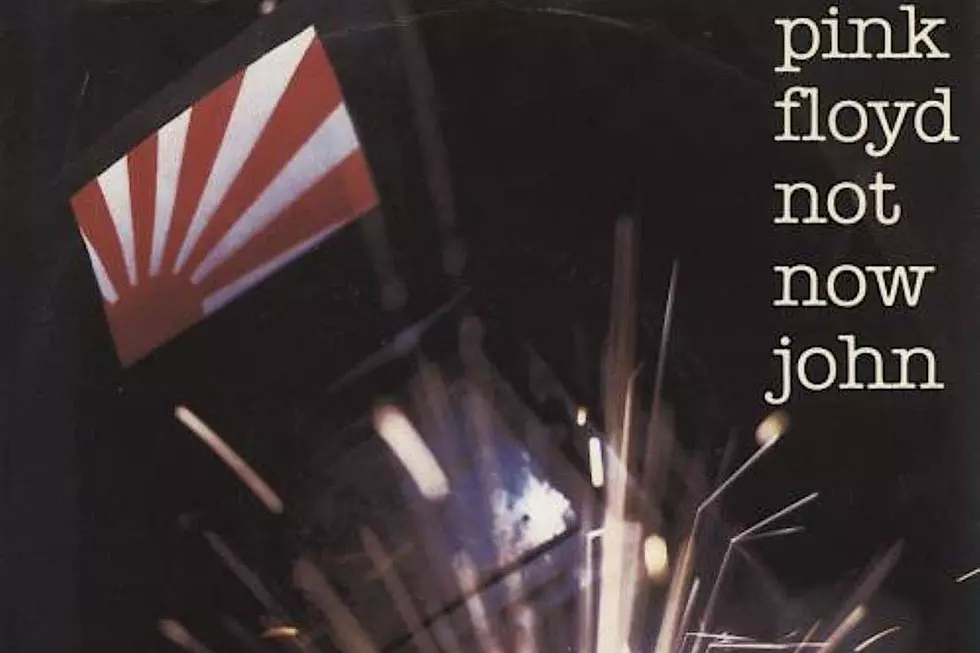
40 Years Ago: Pink Floyd Simply Rages Through ‘Not Now John’
Roger Waters' self-proclaimed requiem for the postwar dream moved inexorably toward "Not Now John," the thunderingly corrosive penultimate song on Pink Floyd's The Final Cut.
Son of a lost World War II soldier, Waters had become outraged by the U.K.'s early-'80s military response in the faraway Falkland Islands. A concurrent attempt to create a soundtrack for the film version of Pink Floyd's preceding album, The Wall, suddenly took on its propulsion as a deeply personal sequel harangue against warmongers. "The rest of us just drifted into it," bandmate Nick Mason later honestly admitted.
The Final Cut wasn't without its moments of fragile ambition – "The Gunner's Dream" pleads for us to make good on a dying airman's hopes for peace – but more often Waters took lyrical aim at everyone from "incurable tyrants and kings" to "colonial wasters of life and limb." Still, up until "Not Now John," the results hadn't been as bombastic as The Wall.
Instead, Waters offered some of the most intricate and heartfelt vocals of his career. The LP also tended to take on a quieter tone as David Gilmour's influence continued to recede, initially only offering the occasional eruptive solo.
"Roger addresses himself to whole problems in life and then tries to expand and broaden that and make a whole album fit around that sort of idea," Gilmour told The Boston Globe in 1984. "He wants to explore that idea in very, very, very great depth from many angles – which I don't have any disagreement with but, I mean, there are moments when I personally would not make some of the things quite so preachy and complaining."
There was nothing so preachy and complaining on The Final Cut as "Not Now John," which ferociously argued that without some guiding sense of humanity we're all doomed to a life of fear, empty avarice, xenophobia and conflict.
Gilmour finally steps forward to sing, as Pink Floyd reverses the approach taken on the mic for "Comfortably Numb": Waters leads the chorus while Gilmour handles the verses. Either way, they simply bark out lines amid a pulverizing din that's presumably meant to echo the twin engines of commerce and war.
Watch Pink Floyd's 'Not Now John' Video
Waters tops it all off with a heaping helping of nihilism, as this deceptively upbeat group of background singers repeatedly responds: "Fuck all that!" He might have also been angrily dismissing warfare itself. Or maybe Gilmour and Waters were speaking to one another through the lyric: By this point, their partnership had deteriorated to the point that Waters' parts were recorded by engineer Andy Jackson while co-producer James Guthrie worked with Gilmour.
They were only occasionally in the same room at the same time. "The relationship was definitely frosty by that stage," Jackson later told radio interviewer Craig Bailey. "I don't think anyone would want to deny that. So, the time that Dave – Dave in particular – and Roger were in the studio together, it was frosty. There's no question about it."
In this way, "Fuck all that!" was brilliant as an album-defining summation. As a single, however, it was a problem. Columbia Records ended up having Waters, Gilmour and the others punch in a new word over "fuck," which originally appeared on the lyric sheet more than half a dozen times.
"Stuff all that!" just didn't have the same impact, however, and "Not Now John" crept to only No. 30 on the U.K. chart while failing to chart at all on the Billboard Hot 100. The Final Cut went on to triple-platinum certification, but that too was considered a deep disappointment at the time.
Perhaps unsurprisingly, these commercial considerations meant little to Waters. "It's absolutely ridiculous to judge a record solely on sales," he told Q magazine in 1987. "If you're going to use sales as the sole criterion, it makes [the soundtrack to] Grease a better record than [Paul Simon's] Graceland.
"Anyway, I was in a greengrocer's shop, and this woman of about 40 in a fur coat came up to me," he added. "She said she thought it was the most moving record she had ever heard. Her father had also been killed in World War II, she explained. And I got back into my car with my three pounds of potatoes and drove home and thought, 'Good enough.'"
Rock's Ugliest Band Breakups
When Alice Cooper Got Stoned with Pink Floyd

